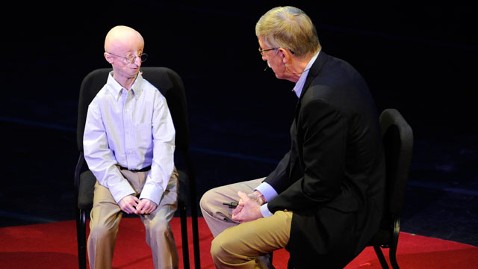Teaching Old Drugs New Tricks for Rare Diseases

NIH director Dr. Francis Collins spoke to Sam Berns, who has a rare condition called Progeria. (Image credit: TedMed)
Sam Berns of Boston is a ninth-grader stuck in an 80-year-old man's body. He has progeria, a rare disease that has aged his body faster than his mind.
Although his condition limits him physically, he says there's nothing he puts his mind to that he can't do.
"When there is something I really want to do that Progeria gets in the way of, like marching band or umpiring, we always find a way to do it," Sam told a crowd of nearly 1,500 people at the annual TedMed conference today in Washington, D.C.
So don't think for a second that you can tell Sam there's no treatment for his condition.
Although research for any treatment for any rare disease, including progeria, has been slow going, the message for researchers who are trying to knock out rare diseases might be this: Don't start from scratch.
Indeed, the drug treatment that has shown promise for progeria was not developed for progeria but for cancer. And the same might be true for other rare diseases. Drugs that once looked promising for prominent diseases such as cancer are increasingly being repurposed to treat unrelated rare diseases, and they're actually working, Dr. Francis Collins, director of the National Institutes of Health, told the TedMed crowd.
Sam is being treated by a drug called Farnesyltransferase inhibitors, which is considered a cancer treatment. But the drug might also mask the gene mutation that's associated with progeria.
The repurposing of drugs that may have failed clinical trials for one type of disease but have shown promise in others will help get more rare diseases treatments out to the public, and out faster, according to Collins.
"It's a win for company, because they have a product that can give them something rather than a dead end drug that has failed," Collins told ABC News. "And it's a win for the public. It's the answer diseases that wouldn't otherwise been looked at so quickly."
Sam said participating in clinical trials is his contribution toward helping researchers find the right treatment, which might come in the form of a drug's second wind.
"Research on progeria has come so far in less than 15 years, and that just shows the drive that researchers can have," Sam said. "If that drive exists, anyone can cure any disease."